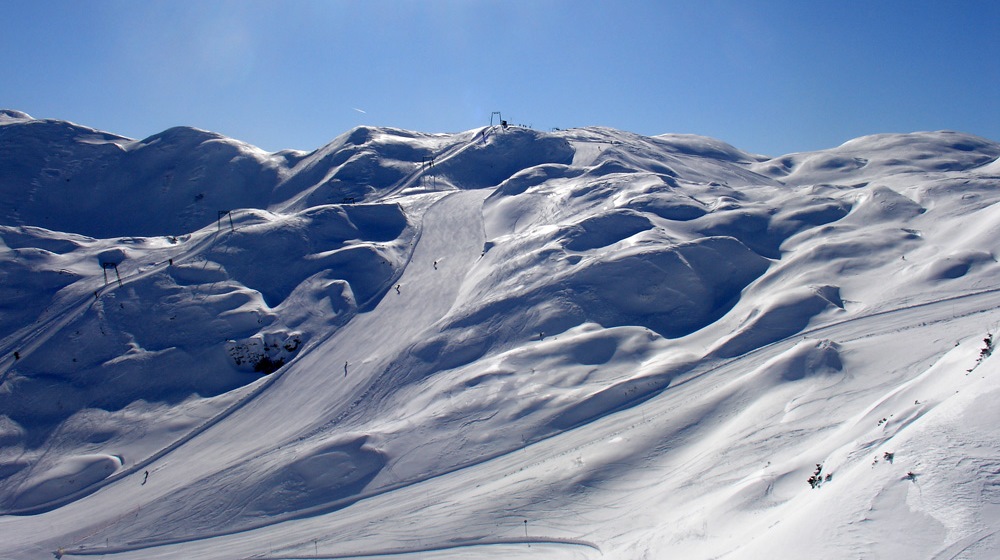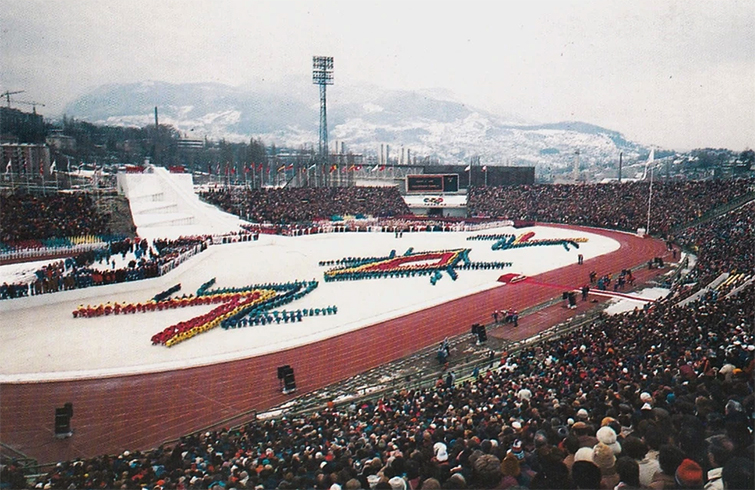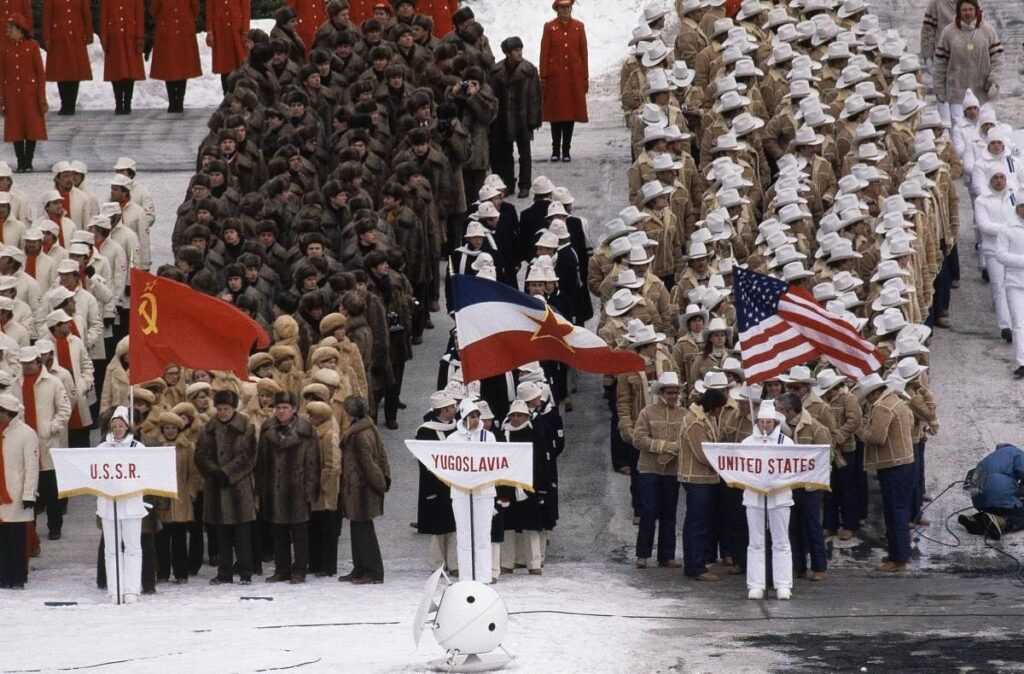I think it borders on impossible to write about any important event in the Balkans without encountering layers of complication and the 1984 Olympic Games in Sarajevo are no exception primarily because there are the Games and there is the aftermath. I’m inclined to write about them separately so I’ll start with
The miracles of Sarajevo
Miracle the first
The simple fact that Sarajevo won the bid was something of a miracle. Admittedly, the Sarajevo that entered the bidding process to host the Games in the late 1970s was stronger economically than that city had been a decade or two prior. Still, despite the natural beauty of the area, Sarajevo wasn’t then and isn’t now a place where fashionable Europeans go to ski. In fact, the most reasonable of the Yugoslav Republics to host the Olympics would have been Slovenia. Slovenia had a history of winter sports, beautiful mountains, pre-existing facilities such as Vogel with its well developed ski resorts,
(Wikimedia Commons BY Gremi35 CC BY-SA 3.0)
and a history of hosting other international competitions. Bosnia had none of those.
Also, if you take a broad view of the Olympic movement, it was somewhat shaky through the seventies and eighties – a shakiness that began with the 1972 massacre in Munich and the subsequent boycotts suffered by Montreal, Moscow, and Los Angeles. When it came time to bid, only three cities vied to host the Games – Gothenburg, Sweden, Sapporo, Japan, and Sarajevo, Yugoslavia. Gothenburg was problematic because of its location. The Nordic and contained area events (such as speed and figure skating) could be held in the host city near the coast but the Alpine events would have to be held more than 500 kilometers away. The barrier for Sapporo was that it had hosted just 12 years before. So, Sarajevo it was and Yugoslavia became the first socialist country to host the Games.
Miracle the second
In a typical Bosnian winter Sarajevo would have accumulated nearly half a meter of snow by the scheduled date of the opening ceremony on 8 February. In the winter of 1984, there had been none. The world had come to Sarajevo for the Winter Games and, on the night of 7 February, all they could do was dance and party in the Baščaršija in spring like weather. But late that night, the snow began. Thirty years later, the writer and journalist Azra Nuhefendić wrote this:
In such an atmosphere it began to snow. I still remember exactly where I was: on Vase Miskina, today Ferhadija street, where the old part of the city, the Baščaršija, begins. There were people jumping with joy. Others held hands and danced, someone screamed. I was laughing uncontrollably, holding my arms open, turning around with my head up. I wanted to feel the snowflakes on my face.
I believe that on that evening many Communist leaders, necessarily atheists, thanked God.
It kept snowing in earnest, all night. The snow was beautiful, dry, the kind that does not dissolve immediately, but stays. The snowflakes were big, stylish as butterflies. At first the snow was falling shyly, then more and more dense. It seemed that someone up there had opened up a bag, and was no longer able to control the speed at which it emptied.
Before, we had been worried because there was no snow. Now, the situation had reversed. In a few hours there was more than a metre of snow.
(From Remembering Yugoslavia)
In fact, a city that hours before had been desperate for snow now had too much. Soldiers from the Yugoslav Army marched through the streets packing down and removing snow. Even more, the weather turned so quickly that some Alpine events had to be delayed.
Juan Antonio Samaranch, opening his first Olympics as IOC President, said simply, “Hvala Yugoslavia.”
Miracle the third
The miracle isn’t that Egypt, the British Virgin Islands, Monaco, Puerto Rico, and Senegal made their Winter Olympics debuts. The third miracle is that after the African led boycott of the 1976 Games in Montreal, the U.S. led boycott of Moscow in 1980, and the Soviet led boycott of Los Angeles that would take place later in 1984, a record 49 nations sent 1,272 (274 women, 998 men) athletes to compete in 39 events at the Sarajevo games.
Could international tensions seep into these Winter Games? Perhaps. But the residents of Sarajevo did all they could to obscure them by welcoming foreigners with an “Olimpijske osmijeh,” – an Olympics smile. And perhaps this photo from the opening ceremony provides a visual buffer.
(From Aleksandar Brezar – Twitter)
Still, who could forget the Games’ mascot, Vučko.
In the competition
The Olympic flag was raised upside down during the opening ceremony by mistake.
The Alpine skiing races took place on two different mountains: the men’s events were contested on Bjelašnica and the women’s events on Jahorina. The events started on 13 February four days behind schedule, because of strong winds (up to 200 km/h) and heavy snowfall.
A 20km race was added to women’s Nordic skiing. Finland’s Marja-Liisa Kirvesmiemi-Hämäläinen won the race and completed a gold medal sweep having won the 5km and 10 km races earlier in the Games. She added a bronze medal in the 4 x 7.5 kilometer relay.
Four years after their shocking loss to the U.S. ice hockey team in Lake Placid, the U.S.S.R. rebounded to win the gold medal outscoring their opponents by a collective score of 58-6.
In figure skating, American Scott Hamilton edged Canadian Brian Orser for the men’s gold medal and 19 year old Katerina Witt representing the GDR in her first Olympic Games won gold over the reigning world champion Rosalynn Sumners who took the silver.
It was perfect 10s across the board in artistic impression for British ice dancers Jayne Torvill and Christopher Dean who mesmerized everyone watching with their interpretation of Maurice Ravel’s “Bolero.”
Half of the United States’ total of eight medals came in Alpine Skiing. Bill Johnson won the downhill, twin brothers Phil and Steve Mahre won gold and silver respectively in the slalom. This was the eighth time siblings won gold and silver in the same event but the first time twins accomplished the feat.
Slovenian Jure Franko, won the silver medal in giant slalom not only winning the first Yugoslav medal in the history of the Winter Games but continuing the streak of the host country winning at least one medal in every Olympics.
This was the first Olympic appearance by U.S. speed skaters Dan Jansen and Bonnie Blair.
Canada’s Gaétan Boucher and East Germany’s Karin Enke each won two speed skating gold medals. Norwegian biathlete Eirik Kvalfoss earned a complete set of medals winning gold in the sprint, silver in the relay, and bronze in the individual.
The U.S.S.R. won the most medals 25 (6/10/9) but the GDR (East Germany) was a close second with 24 and claimed the most gold medals – nine – of any nation.
In the next chapter I’ll have more about the Games and the aftermath.


